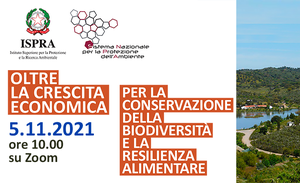Beyond economic growth for the protection of biodiversity and food resilience
An article published in 2021 by the European Environment Agency (EEA), entitled "Growth without economic growth" will be the focus of a seminar that ISPRA organizes for November 5, 2021. The article, published in Narratives for Change, a series of analyzes and prospective studies on the factors of change and transition, to explore alternative ideas on growth and progress, with the aim of broadening the debate on sustainability.
- https://development.isprambiente.gov.it/en/archive/ispra-events/2021/11/beyond-economic-growth-for-the-protection-of-biodiversity-and-food-resilience
- Beyond economic growth for the protection of biodiversity and food resilience
- 2021-11-05T10:00:00+00:00
- 2021-11-05T13:00:00+00:00
- An article published in 2021 by the European Environment Agency (EEA), entitled " Growth without economic growth " will be the focus of a seminar that ISPRA organizes for November 5, 2021. The article, published in Narratives for Change, a series of analyzes and prospective studies on the factors of change and transition, to explore alternative ideas on growth and progress, with the aim of broadening the debate on sustainability.
- When Nov 05, 2021 from 10:00 AM to 01:00 PM (GMT+0 / UTC0)
- Where Online event
-
Add event to calendar
iCal
The key messages of the study are:
- The ongoing ‘Great Acceleration’ in loss of biodiversity, climate change, pollution and loss of natural capital is tightly coupled to economic activities and economic growth.
- Full decoupling of economic growth and resource consumption may not be possible.
- Doughnut economics, post-growth and degrowth are alternatives to mainstream conceptions of economic growth that offer valuable insights.
- The European Green Deal and other political initiatives for a sustainable future require not only technological change but also changes in consumption and social practices.
- Growth is culturally, politically and institutionally ingrained. Change requires us to address these barriers democratically. The various communities that live simply offer inspiration for social innovation.
What could be achieved in terms of progress if the European Green Deal were implemented with the aim of inspiring citizens, communities and businesses to create innovative social practices with low environmental impact and aimed at social well-being and personal growth?
To answer this question, the ISPRA seminar focuses on the agricultural and food sector. Scientific evidence indicates that agricultural and food systems are among the major drivers of alteration of bio-geo-physical processes on a planetary scale, at the source of the climate crisis and the erosion of biodiversity, and that a transformative change is necessary in terms of sustainability. The "Farm to Fork" "Biodiversity" Strategies, the CAP and other EU policy initiatives for a sustainable future, call for transformations in the production and consumption of food, fiber and wood, use of resources.

